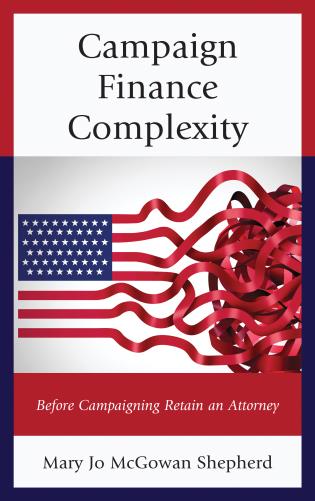Book Delves Into Campaign Finance Complexity

Newcomers wanting to run for public office face a steep learning curve, as measured in time and effort. Author Mary Jo McGowan Shepherd, a lecturer in the Department of Political Science and Public Administration at UNC Charlotte, in her new book, Campaign Finance Complexity: Before Campaigning Retain an Attorney (Lexington Books), examines the hurdles created by the campaign system and the potential impact on democracy.
“The importance of understanding how the candidacy process affects individuals cannot be underestimated,” Shepherd writes. “We must understand if there are serious impediments to individuals who actually would like to run for office but do not. Constraints may prevent the democratization goal of campaign finance legislation from actualization.”
The campaign finance system regulates campaign contributions and behavior with the intent to eliminate corruption or the potential for corruption in elections, she finds. With that goal in mind, state legislators created statutes regulating campaign behavior. Each state has wide variation in the complexity of campaign finance regulations, including the language used and whether it is complex or “plain language,” Shepherd writes. Regulatory systems create a network of rules and regulations, and campaign finance is no different. The difference is in the behavior regulated and the potential negative impacts of a complex regulatory system.
 Candidates running for office must take time and effort to learn and comply with campaign finance regulations to compete in an election. If campaign finance regulations are complex, the time and effort required to learn and comply with them increases. This means that candidates may have less time and attention to focus on their campaign.
Candidates running for office must take time and effort to learn and comply with campaign finance regulations to compete in an election. If campaign finance regulations are complex, the time and effort required to learn and comply with them increases. This means that candidates may have less time and attention to focus on their campaign.
Shepherd considers whether states with complex regulations have fewer candidates running for office or more candidates withdrawing their candidacy after starting a campaign. This potentially negative consequence of campaign regulations has an impact on participation rates for individuals running for office. To maintain a diverse candidate pool, a democracy needs more candidates, rather than a limited number. A complex regulatory system, by increasing candidate costs, may adversely affect that goal, she finds.
Shepherd teaches courses in international, comparative politics, and public policy. She also teaches and administers the award winning Model United Nations program at UNC Charlotte. Her research interests are in public policy, policy process, institutions, campaign finance, and elections administration.